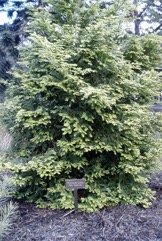Plum-fruited yew, Chilean plum yew

It is a warm temperate plant. It grows naturally in the high Andes mountains. In Chile it grows between 500-2,000 m altitude. It is best in humid areas with constant rainfall but can tolerate some dry periods. It can grow in light shade. It suits hardiness zones 8-10. It can tolerate some frost and snow. Arboretum Tasmania. Hobart Botanical Gardens.
Also known as:
Andes prumnopitys, Lleuque, Maniu, Pino, Uva de cordillera
Synonyms
- Nageia andina (Poepp. ex Endl.) F. Muell.
- Nageia valdiviana (J. Nelson) Kuntze
- Podocarpus andinus Poepp. ex Endl.
- Podocarpus spicatus Poepp. [Illegitimate]
- Podocarpus valdivianus J. Nelson
- Prumnopitys elegans Phil.
- Prumnopitys spicata Molloy & Munoz-Schick
- Stachycarpus adinus (Poepp. ex Endl.) Tiegh.
Edible Portion
- Fruit, Seeds
Where does Plum-fruited yew grow?
Found in: Andes, Argentina, Australia, Britain, Chile, Europe, New Zealand, South America, Tasmania
Growing Plum-fruited yew, Chilean plum yew
Cultivation: Plants can be grown from seed or cuttings. The seeds are very difficult to germinate due to the hard seed coat. To get seed to grow they are put in sand and kept moist for several months. The hard shell can be scraped or treated with chemicals.
Edible Uses: The kernel of the nut is eaten. The fruit has a sweet taste and are eaten.
Nutrition Info
per 100g edible portion| Edible Part | Energy (kcal) | Protein (g) | Iron (mg) | Vitamin A (ug) | Vitamin c (mg) | Zinc (mg) | % Water |
|---|---|---|---|---|---|---|---|
| - | - | - | - | - | - |
Plum-fruited yew, Chilean plum yew Photos

References
Blumea 24:189. 1978
Coombes, A.J., 2000, Trees. Dorling Kindersley Handbooks. p 78 (As Podocarpus andinus)
Cordero, S. E., Abello, L. A., & Galvez, F. L., 2017, Plantas silvestres comestibles y medicinales de Chile y otras partes del mundo. CORMA p 105
Crowe, A., 1997, A Field Guide to the Native Edible Plants of New Zealand. Penguin. p 23 (As Podocarpus andinus)
Cundall, P., (ed.), 2004, Gardening Australia: flora: the gardener's bible. ABC Books. p 1090
Daly, A. B., 20014, Narrating changing foodways: wild edible plant knowledge and traditional food systems in Mapuche lands of the Andean Temperate Forests, Chile. Masters Thesis Vancouver. p 45
Grandtner, M. M. & Chevrette, J., 2013, Dictionary of Trees, Volume 2: South America: Nomenclature, Taxonomy and Ecology. Academic Press p 539
Harris, E & J., 1983, Field Guide to the Trees and Shrubs of Britain. Reader's Digest. p 231 (As Podocarpus andinus)
Hedrick, U.P., 1919, (Ed.), Sturtevant's edible plants of the world. p 509 (As Podocarpus andinus)
Kermath, B. M., et al, 2014, Food Plants in the Americas: A survey of the domesticated, cultivated and wild plants used for Human food in North, Central and South America and the Caribbean. On line draft. p 708
Marinelli, J. (Ed), 2004, Plant. DK. p 150
Phillips, R. & Rix, M., 2002, The Botanical Garden Vol. 1. Trees and Shrubs. MacMillan. p 21 (As Podocarpus andinus)
Plants for a Future database, The Field, Penpol, Lostwithiel, Cornwall, PL22 0NG, UK. http://www.scs.leeds.ac.uk/pfaf/
Rapoport, E. H. & Ladio, A. H., 1999, Plantas comestibles. Bosque Volume 20 No. 2. ISSN 0314-8799
Syn. conif. 219. 1847 "andina" (As Podocarpus andinus)
www.chileflora.com